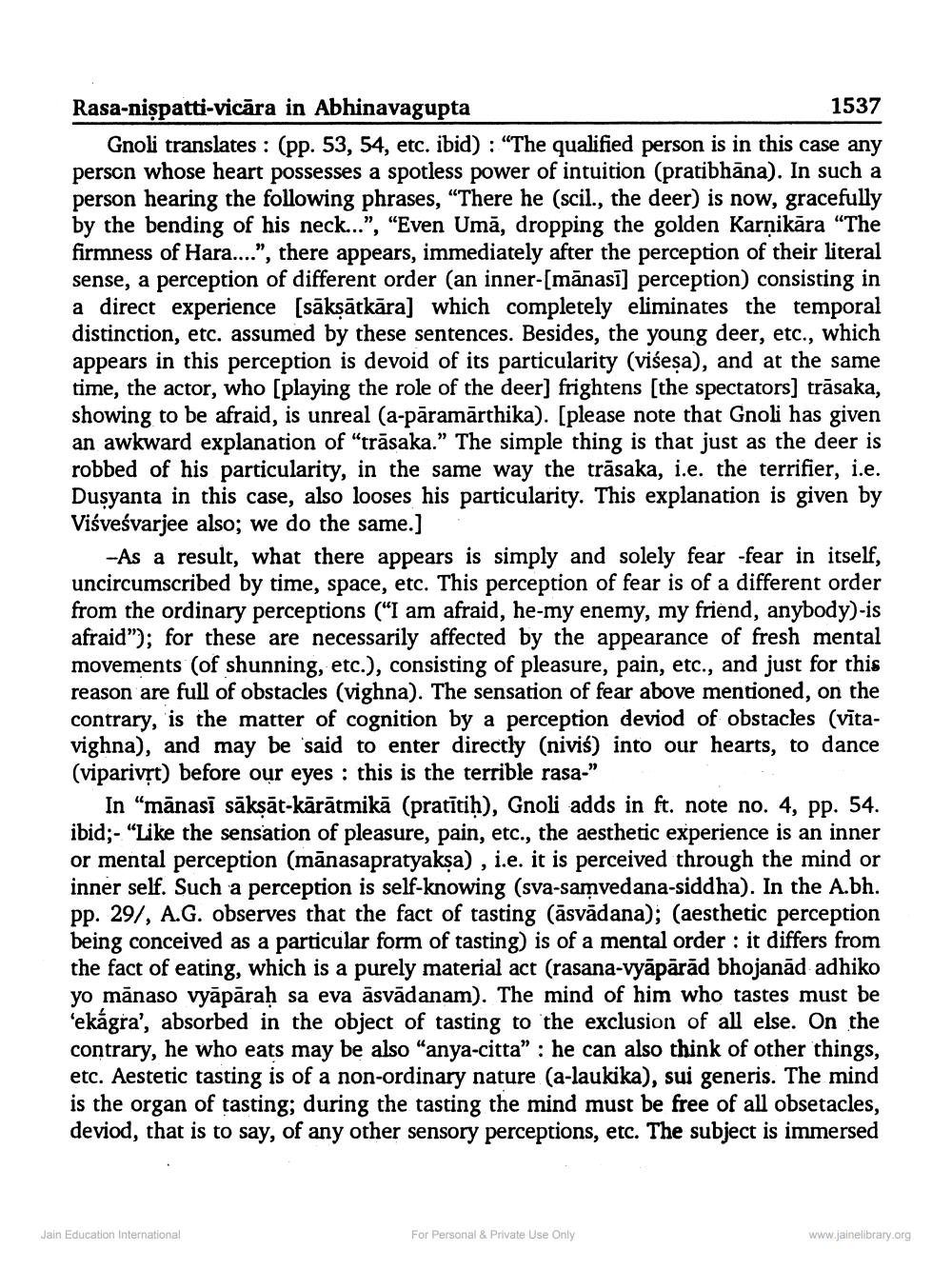________________
Rasa-nişpatti-vicāra in Abhinavagupta
1537 Gnoli translates : (pp. 53, 54, etc. ibid): "The qualified person is in this case any person whose heart possesses a spotless power of intuition (pratibhāna). In such a person hearing the following phrases, “There he (scil., the deer) is now, gracefully by the bending of his neck...", "Even Umā, dropping the golden Karnikāra “The firmness of Hara....", there appears, immediately after the perception of their literal sense, a perception of different order (an inner-[mānasī) perception) consisting in a direct experience (sāksātkāra] which completely eliminates the temporal distinction, etc. assumed by these sentences. Besides, the young deer, etc., which appears in this perception is devoid of its particularity (višesa), and at the same time, the actor, who (playing the role of the deer) frightens (the spectators] trāsaka, showing to be afraid, is unreal (a-pāramārthika). (please note that Gnoli has given an awkward explanation of "trāsaka.” The simple thing is that just as the deer is robbed of his particularity, in the same way the trāsaka, i.e. the terrifier, i.e. Dusyanta in this case, also looses his particularity. This explanation is given by Viśveśvarjee also; we do the same.)
-As a result, what there appears is simply and solely fear -fear in itself, uncircumscribed by time, space, etc. This perception of fear is of a different order from the ordinary perceptions (“I am afraid, he-my enemy, my friend, anybody)-is afraid"); for these are necessarily affected by the appearance of fresh mental movements (of shunning, etc.), consisting of pleasure, pain, etc., and just for this reason are full of obstacles (vighna). The sensation of fear above mentioned, on the contrary, is the matter of cognition by a perception deviod of obstacles (vītavighna), and may be said to enter directly (nivis) into our hearts, to dance (viparivrt) before our eyes : this is the terrible rasa-"
In "mānasī sāksāt-kārātmikā (pratītih), Gnoli adds in ft. note no. 4, pp. 54. ibid;- "Like the sensation of pleasure, pain, etc., the aesthetic experience is an inner or mental perception (mānasapratyakşa), i.e. it is perceived through the mind or inner self. Such a perception is self-knowing (sva-samvedana-siddha). In the A.bh. pp. 297, A.G. observes that the fact of tasting (āsvādana); (aesthetic perception being conceived as a particular form of tasting) is of a mental order : it differs from the fact of eating, which is a purely material act (rasana-vyāpārād bhojanād adhiko yo mānaso vyāpārah sa eva āsvādanam). The mind of him who tastes must be ‘ekágra', absorbed in the object of tasting to the exclusion of all else. On the contrary, he who eats may be also "anya-citta" : he can also think of other things, etc. Aestetic tasting is of a non-ordinary nature (a-laukika), sui generis. The mind is the organ of tasting; during the tasting the mind must be free of all obsetacles, deviod, that is to say, of any other sensory perceptions, etc. The subject is imme
Jain Education International
For Personal & Private Use Only
www.jainelibrary.org




